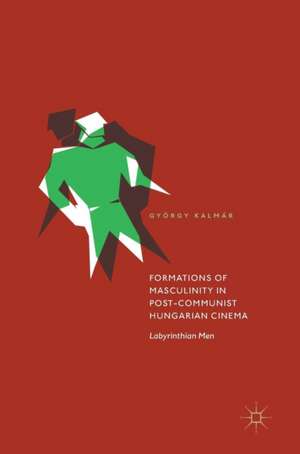Formations of Masculinity in Post-Communist Hungarian Cinema: Labyrinthian Men
Autor György Kalmáren Limba Engleză Hardback – 4 oct 2017
| Toate formatele și edițiile | Preț | Express |
|---|---|---|
| Paperback (1) | 446.65 lei 6-8 săpt. | |
| Springer International Publishing – 18 mai 2018 | 446.65 lei 6-8 săpt. | |
| Hardback (1) | 585.40 lei 6-8 săpt. | |
| Springer International Publishing – 4 oct 2017 | 585.40 lei 6-8 săpt. |
Preț: 585.40 lei
Preț vechi: 688.71 lei
-15% Nou
Puncte Express: 878
Preț estimativ în valută:
112.05€ • 121.75$ • 94.18£
112.05€ • 121.75$ • 94.18£
Carte tipărită la comandă
Livrare economică 21 aprilie-05 mai
Preluare comenzi: 021 569.72.76
Specificații
ISBN-13: 9783319636634
ISBN-10: 3319636634
Pagini: 164
Ilustrații: XXIV, 164 p. 28 illus. in color.
Dimensiuni: 148 x 210 mm
Greutate: 0.46 kg
Ediția:1st ed. 2017
Editura: Springer International Publishing
Colecția Palgrave Macmillan
Locul publicării:Cham, Switzerland
ISBN-10: 3319636634
Pagini: 164
Ilustrații: XXIV, 164 p. 28 illus. in color.
Dimensiuni: 148 x 210 mm
Greutate: 0.46 kg
Ediția:1st ed. 2017
Editura: Springer International Publishing
Colecția Palgrave Macmillan
Locul publicării:Cham, Switzerland
Cuprins
1. Introduction.- 2. The labyrinth principle: Figures of entrapment in Hungarian art-house cinema.- 3. Historical ruptures and ironic masculinities. (Moscow Square. Ferenc Török, 2001).- 4. Men on the margins of history. (Hukkle. György Pálfi, 2002).- 5. Just the Wind. Benedek Fliegauf, 2012).- 9. Conclusions.
Recenzii
“This study of New Hungarian Cinema provides an interesting outline of important films from the new millennium and will be of interest to those interested in film as well as in recent Hungarian social and cultural studies.” (Clara Orban, Hungarian Cultural Studies, Vol. 13, 2020)
Notă biografică
György Kalmár is Reader in film and cultural studies at the Department of British Studies of the University of Debrecen, Hungary. His main teaching and research areas include literary and cultural theory, contemporary Hungarian film, gender studies, and British literature. He has published extensively in the above mentioned fields.
Caracteristici
The first book-length study on post-communist Hungarian cinema and masculinities Offers an in-depth analysis of male figures in Hungarian cinema and the identity-politics of post-communism Explores post-communist cinema and its masculinities in a wide social, cultural and historical perspective Includes supplementary material: sn.pub/extras
